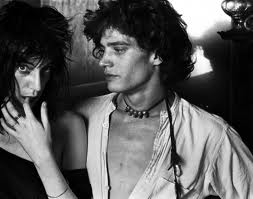“…a perfect balance of faith and execution”
 Like a whole lot of people, I just read Patti Smith’s memoir of her relationship with Robert Mapplethorpe. (Erika did too, first, and I’m kind of stealing this blog from her. She gets to write about the next incredible book that makes both of us weep, whatever the hell that will be.) The book is a totally compelling portrait of a New York that is long past – one whose tribulations and explorations are almost invisible now, precisely because they’re at the root of so much of everything in this city – but the real weight of the book for me was in the deeply personal, and really pretty matter-of-fact, meditations on art and love that guide the entire narrative.
Like a whole lot of people, I just read Patti Smith’s memoir of her relationship with Robert Mapplethorpe. (Erika did too, first, and I’m kind of stealing this blog from her. She gets to write about the next incredible book that makes both of us weep, whatever the hell that will be.) The book is a totally compelling portrait of a New York that is long past – one whose tribulations and explorations are almost invisible now, precisely because they’re at the root of so much of everything in this city – but the real weight of the book for me was in the deeply personal, and really pretty matter-of-fact, meditations on art and love that guide the entire narrative.
Art and love! What’s not to like? Seriously, she and Mapplethorpe met as kids (so the title says) in a bewildering city, and she writes to how their art and their love grew up entirely hand in hand, commanding and fulfilling the two of them, wearing them down and building them up, and quite literally making their home. The shifting epochs of Smith/Mapplethorpe love are all profoundly portrayed in their own right, and the losses that they were dealt are heartrending. But maybe because on some level un-easy love is familiar to everyone, the strongest revelations of the book, for me, were her discussions of un-easy art. The book is a steady recounting of working SO HARD, of loads of self-doubt, especially initially, and of losing so much in trying to create something meaningful, but it all manages to wholly inspire rather than terrify or turn-away.
Our curiosity about Harry Smith (who features wonderfully prominently in this book – and is now featuring more prominently in this blog section for whatever it’s worth) led us to Rosebud Pettet, who Harry called his “spiritual wife” for the last three decades of his life. I went to go visit Rose in her Manhattan apartment last week and our conversation moved to the Patti Smith book, because of the Chelsea Hotel connection, and because the book has been quite on-the-mind, as they say. “This book is the purest thing”, Rose said. It’s pure hard and yearning love, though: for Mapplethorpe and his restlessness, for the poets and artists whose work so moves Smith, for God whose measure of light she finds all around, and for the art by which she might pay this light some just homage, if she really, really works at it. Yearning “to achieve within the work a perfect balance of faith and execution.”
I could sure go on. Erika just came in to read this post and had a whole other angle on what made the book moving. Just read the thing, if you haven’t already…
